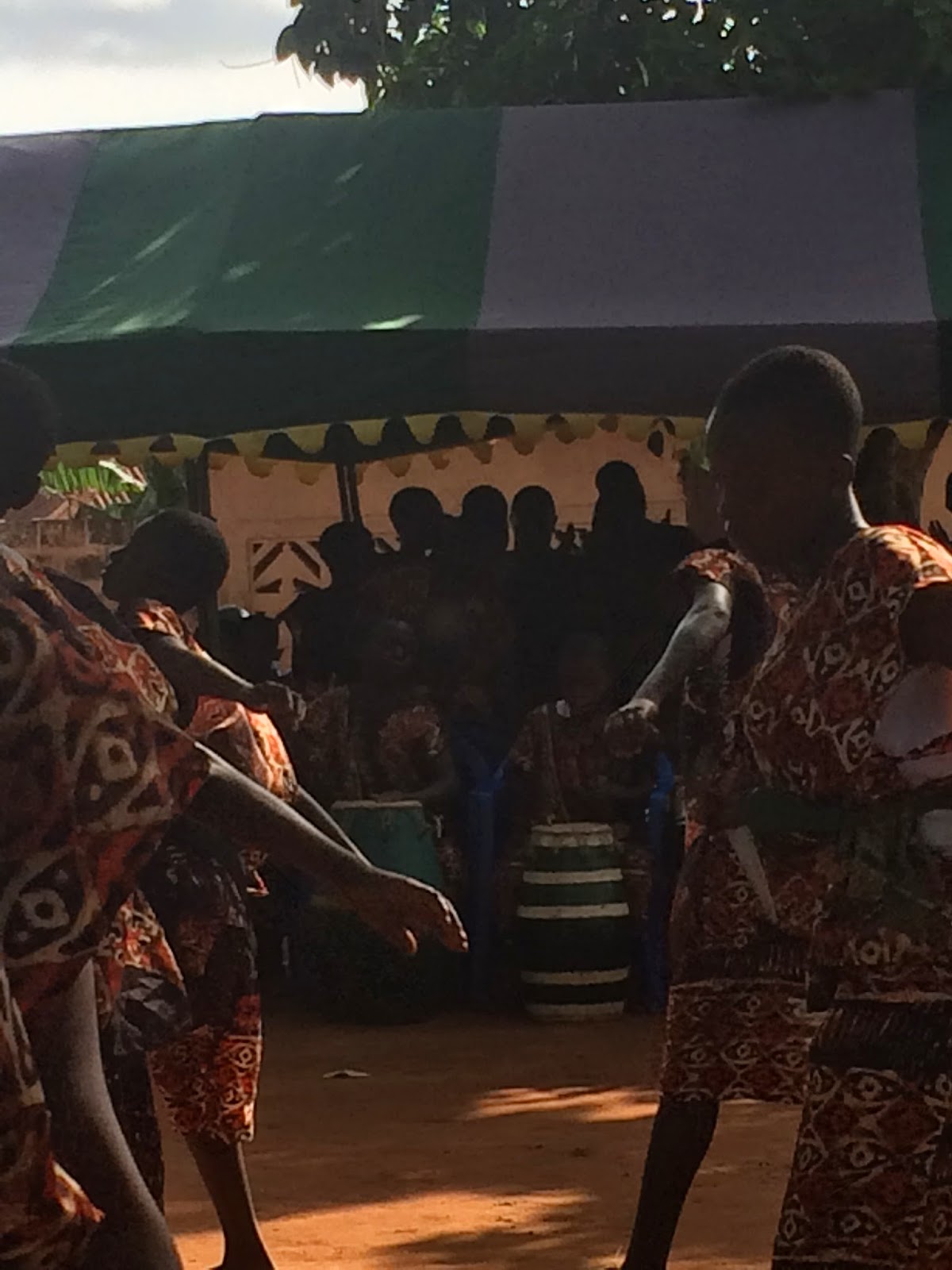Under My Skin
The children played and danced for two hours. They had us on
our feet many times, singing, dancing and, in the end, joining the dancers as
they moved about the courtyard. Now the concert was over, and the brass band
from Nunya Academy, after a prolonged time of being greeted and praised by us,
and playing games with us (I taught them “Baby Shark”), were finally saying
goodbye.
“May I ask you a question?” said the ten-year-old boy whose
stamina on the trumpet had amazed me.
“Of course,” I said.
“When do you think you will return to Ghana?”
I felt my heart break.
The Nunya children have performed for us four times in the
last two weeks. Nunya is a school without a building, the dream of Kofi
Gbolonyo, a local boy from Dzodze who has made it big in the academic world,
traveling to America to earn his doctorate in ethnomusicology and finding a
teaching position at the University of British Columbia. While still living in
Ghana, he envisioned a music school where the poor children of his village
could learn to play and sing the both the traditional music of their homeland
and of the western world. His brother, Prosper, and cousin, Benzola, teach and
direct the children in his absence. From British Columbia, he has, from his own
resources, purchased two container-loads of used band instruments, accepting
donations only to help with shipping. Once in Dzodze, the instruments are
reconditioned by self-taught technicians. Benzola teaches all the instrumental
technique; Prosper teaches the theory and directs the band. The academy meets
in borrowed space after school. Kofi recently purchased a plot of land outside
Dzodze, and intends to construct school buildings there, so that the academy
can be a day school where music is at the heart of a full curriculum.
On our second night in Dzodze, the children came to perform
traditional drumming and dancing, and they had us. After the performance they
stayed for two hours, playing games with us, jamming on the drums, delighting
us with their openness and eagerness to try new things. They were back two
nights later with an evening of choreographed music games. On Saturday, we were
present at a recognition ceremony at which the band and dancers performed.
Finally last night, it was the brass band, this time having traveled an hour
and a half to the Bob Coffie Hotel in Ho, where we are staying until tomorrow
morning.
I have been astonished with how guileless these children
are, how much they delight in our attention. They range in age from 10 to 19,
so some of them are at the age at which young people find adults hilariously
clueless and hopelessly square, and yet these teens were as eager as the
youngest in the group to learn playground games from us, tackling them with
gusto.
I’ve written many times in this space about how easily I can
become attached to children. The last day of school is always a bittersweet
experience for me, especially when, as at Hartley, there is a ritual of waving
goodbye to the buses. I haven’t taught the Nunya children anything but “Baby
Shark” (though had I thought to bring my trumpet, I could have done some
coaching, as did two others in our group on clarinet and flute.), and yet
somehow they’ve cleared out some space in my heart and climbed inside. When
they ask when I’ll come back to Ghana, and I don’t have an answer, I feel my
heart break just as it did two weeks ago at Hartley, knowing I would not be returning
to that school and seeing any of those children again.
What makes it hurt more is that it’s not just the children.
It’s the country. Yes, some of my experiences here have been irksome lessons in
the realities of third world living: things happen on a far more fluid schedule
than I’m used to, it can take 24 hours to get change for a large bill, vendors
expect bargaining and quote prices far higher than what they expect to receive,
the water is of questionable quality, the internet cuts in and out, and
everywhere (except on hotel grounds) there is litter everywhere—in fact, the
village, the town, the city would all look far less shabby if people used trash
receptacles—in a word, this place is challenging for someone who has never been
outside the first world except for a couple of day trips into Mexico. But the
people are like no others I’ve met, friendly, welcoming, helpful, patient with
my poor understanding of their accent and complete inability to remember any of
the words in their language—or, when I do, to pronounce them in an intelligible
way. Their sincere warmth, their delight in seeing a white person take an
interest in their culture, and their inclusiveness at drawing us into the
dances at every performance and celebration we have been to, goes far beyond anything
I’ve experienced anywhere else.
This is a shabby place of dirt roads, mud huts, ubiquitous
litter, corrupt officials—everything one might expect to find in a third world
country. It is also a thriving democracy with a vibrant culture and an
indefatigable spirit that cannot help but win the heart of anyone with an open
mind.
Anyone like an Orff teacher.
Ghana is under my skin. It’s in my blood. When will I
return?
I can’t say when, but I know the answer begins with “yes.”




Comments
Post a Comment